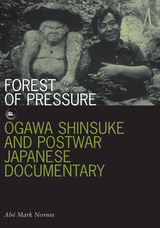
The original foreign film—its sights and sounds—is available to all, but the viewer is utterly dependent on a translator and an untold number of technicians who produce the graphic text or disconnected speech through which we must approach the foreign film. A bad translation can ruin a film’s beauty, muddy its plot, and turn any joke sour.
In this wide-ranging work, Abé Mark Nornes examines the relationships between moving-image media and translation and contends that film was a globalized medium from its beginning and that its transnational traffic has been greatly influenced by interpreters. He discusses the translation of film theory, interpretation at festivals and for coproductions, silent era practice, “ talkies,” subtitling, and dubbing.
Nornes—who has written subtitles for Japanese cinema—looks at the ways misprision of theory translations produced stylistic change, how silent era lecturers contributed to the construction of national cinemas, how subtitlers can learn from anime fans, and how ultimately interpreters can be, in his terms, “traders or traitors.”
Abé Mark Nornes is associate professor of Asian languages and cultures and film and video studies at the University of Michigan. He is the author of Japanese Documentary Film (Minnesota, 2003) and Forest of Pressure (Minnesota, 2007).

“Extraordinarily valuable, illuminating, and even entertaining, Forest of Pressure brims with the types of information that only a key insider can get his hands on.” —Mitsuhiro Yoshimoto, New York University
Ogawa Productions—known in Asia as Ogawa Pro—was an influential filmmaking collective that started in the 1960s under the direction of Ogawa Shinsuke (1936–1992). Between 1968 and the mid-1970s, Ogawa Pro electrified the Japanese student movement with its Sanrizuka documentary series—eight films chronicling the massive protests over the construction of the Narita airport—which has since become the standard against which documentaries are measured in Japan.
A critical biography of a collective, Forest of Pressure explores the emergence of socially committed documentary filmmaking in postwar Japan. Analyzing Ogawa Pro’s films and works by other Japanese filmmakers, Abé Mark Nornes addresses key issues in documentary theory and practice, including individual and collective cinema production modes and the relationship between subject and object. Benefiting from unprecedented access to Ogawa Pro’s archives and interviews with former members, Forest of Pressure is an innovative look at the fate of political filmmaking in the wake of the movement’s demise.
Abé Mark Nornes is associate professor of screen arts and cultures and Asian languages and cultures at the University of Michigan. He is a coordinator at the Yamagata International Documentary Film Festival and the author of Japanese Documentary Film: The Meiji Era through Hiroshima (Minnesota, 2003).

READERS
Browse our collection.
PUBLISHERS
See BiblioVault's publisher services.
STUDENT SERVICES
Files for college accessibility offices.
UChicago Accessibility Resources
home | accessibility | search | about | contact us
BiblioVault ® 2001 - 2024
The University of Chicago Press









